[推荐学习]高中英语 Unit 3 Life in the future Warming up测试题
高中英语-unit-3-Life-In-the-Future-全单元教案

⾼中英语-unit-3-Life-In-the-Future-全单元教案⾼⼆上学期第三次教案设计⼈:Unit 3 Life In the FuturePeriod 1 & 2 Warming Up & Pre-reading, ReadingTeaching Goals:1.To illustrate Ss’ imagination of future life.2.To arouse Ss to pay more attention to the problems that probably appeared in thefuture life.3.To make Ss know the difference of life between the past, present and future. Teaching Procedures:Step 1 Leading-inPurpose: To talk about past and future changes of life.1. Group workLet Ss discuss the questions in groups of four.(1)How do you usually get to school?(2)Where do you live, in a city or in the countryside?(3)Where would you like to live in the future?(4)Do you live in a flat or a house?(5)Do you have a room of you won? Can you describe the room in the picture?(6)What kind of housing would you like to have in the future?(7)What would you like to have in your room?(8)What can we use to build houses? (brick, stone , steel , glass, ice, wood , plasticbamboo, …)2. ConclusionThis unit introduces what life in the future might be like to Ss. By discussing and answering the questions above can make Ss have a general understanding of the present and future life and can also illustrate Ss’ imagination about the future life. Step 2. Warming Up1. Pair workIn pairs let Ss list the changes in housing, transport, jobs, families and education will happen in the next century.2. Individual workAccording to the result of the above Pair work, fill in the chart.Step 3. Pre-reading1. Pair workAsk Ss to discuss the following questions in pairs.(1)Make a list of the problems human beings are facing today.(2) What problems do you think people will have overcome in one thousand years? Which ones do you think will still exist inAD 3008?Suggested Answers:①The first problem I would like to point out is the decline of morality.(道德沦丧)②The second problem is the racial bias problem. (种族歧视)③The third problem , which is a most serious problem , is the rapid depletion of resources on the Earth. (资源匮乏)④Now I come to the fourth problem, the problem of the large gap between the poor and the rich . (贫富悬殊)⑤The fifth problem is the pollution problem.(环境恶化)⑥Now I would like to talk about the sixth problem, the expensive arms race problem. (军备竞争)。
高二必修5 Unit 3 Life in the future重点词汇解析
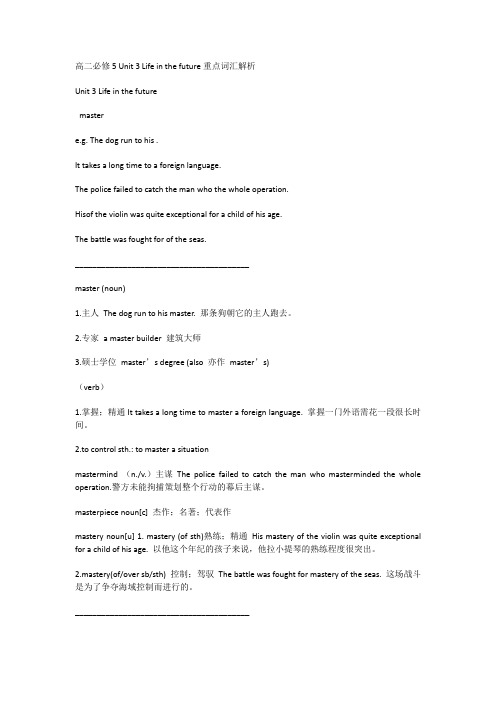
高二必修5 Unit 3 Life in the future重点词汇解析Unit 3 Life in the futuremastere.g. The dog run to his .It takes a long time to a foreign language.The police failed to catch the man who the whole operation.Hisof the violin was quite exceptional for a child of his age.The battle was fought for of the seas.________________________________________master (noun)1.主人The dog run to his master. 那条狗朝它的主人跑去。
2.专家a master builder 建筑大师3.硕士学位master’s degree (also 亦作master’s)(verb)1.掌握;精通It takes a long time to master a foreign language. 掌握一门外语需花一段很长时间。
2.to control sth.: to master a situationmastermind (n./v.)主谋The police failed to catch the man who masterminded the whole operation.警方未能拘捕策划整个行动的幕后主谋。
masterpiece noun[c] 杰作;名著;代表作mastery noun[u] 1. mastery (of sth)熟练;精通His mastery of the violin was quite exceptional for a child of his age. 以他这个年纪的孩子来说,他拉小提琴的熟练程度很突出。
高二英语教案:Unit 3 life in the future
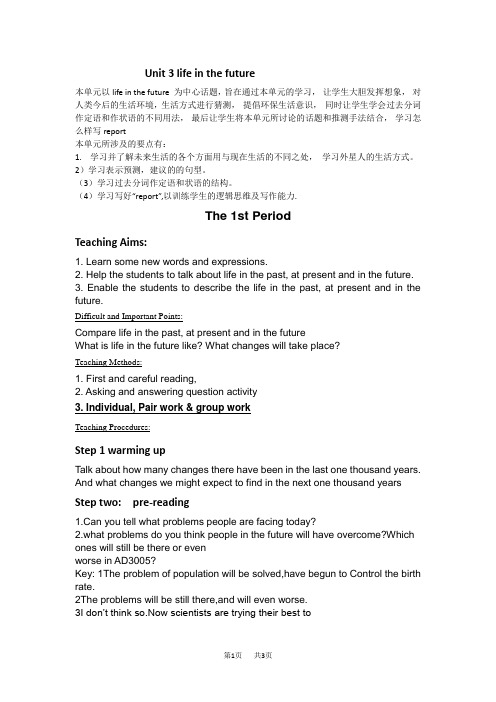
Unit 3 life in the future本单元以life in the future 为中心话题,旨在通过本单元的学习,让学生大胆发挥想象,对人类今后的生活环境,生活方式进行猜测,提倡环保生活意识,同时让学生学会过去分词作定语和作状语的不同用法,最后让学生将本单元所讨论的话题和推测手法结合,学习怎么样写report本单元所涉及的要点有:1.学习并了解未来生活的各个方面用与现在生活的不同之处,学习外星人的生活方式。
2)学习表示预测,建议的的句型。
(3)学习过去分词作定语和状语的结构。
(4)学习写好“report”,以训练学生的逻辑思维及写作能力.The 1st PeriodTeaching Aims:1. Learn some new words and expressions.2. Help the students to talk about life in the past, at present and in the future.3. Enable the students to describe the life in the past, at present and in the future.Difficult and Important Points:Compare life in the past, at present and in the futureWhat is life in the future like? What changes will take place?Teaching Methods:1. First and careful reading,2. Asking and answering question activity3. Individual, Pair work & group workTeaching Procedures:Step 1 warming upTalk about how many changes there have been in the last one thousand years. And what changes we might expect to find in the next one thousand years Step two: pre-reading1.Can you tell what problems people are facing today?2.what problems do you think people in the future will have overcome?Which ones will still be there or evenworse in AD3005?Key: 1The problem of population will be solved,have begun to Control the birth rate.2The problems will be still there,and will even worse.3I don’t think so.Now scientists are trying their best todevelop new resources that human beings can make use of ,such as solar energy.In my opinion……step three fast readingRead the text for the first time and tell what the text is about?It’s an e-mail written by a man Who has taken up a trip to the future.2. Look at the following sentence, there are in wrong order, tell me the correct order for these sentenceA. We were transported into the future by a comfortable time capsule.B. I arrived a t Wang Ping’s home and everything in his house made me surprised.C.I won a travel to the year AD3005D. I have my first try to master a hovering carriage.Step four careful reading1.why did I have the chance to travel to the year AD3005?2. What is a “ time lag”?3. How did I feel when I was in the capsule?4who guides my trip?5.why did my guide give me some tables?6.who transported us to the future?Key 1. I took up the prize I won the year before.2. “Time lag”means a person gets flashbacks from his previous time period.3. The seats in the capsule are very comfortable.4. My friend Wang Ping is my guide to the future.5. The tablets could help me feel less nervous and uncertain6. Wang Ping’s parents’ company transported us to the future.1How did I feel as soon as I was transported to the future?After the writer was transported to the future,he was hit by the lack of fresh air.2.how did Wang Ping solve this problem?Wang Ping gave a mask to the writer and hurried him through to a small room nearby to have a rest.3.what do you think has caused this kind of problem?Now we are causing more and more pollution to the nature,this will cause serious problems to life in the nature.This may be the cause of the lack of fresh air in the future.1 What did Wang Ping’s house look like?His house is a large bright ,clean room.It had a green Wall,a brown floor and soft lighting .2 What was the green wall made of? What’s the purpose of building this kind of green wall?The green wall was made of trees.The leaves of the trees will providemuch-needed oxygen to the house.3 How can you produce a TV set in Wang P ing’s house?You can just flash a switch on the computer screen and a TV set will rise from the floor.Sample answers Ex.2I think the writer has an optimistic view of the future.He was very excited when he traveled to the year AD 3005 an d couldn’t elieve if was true.From this,we can see he is eager to go to the future.Though ehe was hit by the lack of fresh air,。
【高考】高考英语一轮复习Unit3Lifeinthefuture讲新人教版必修5
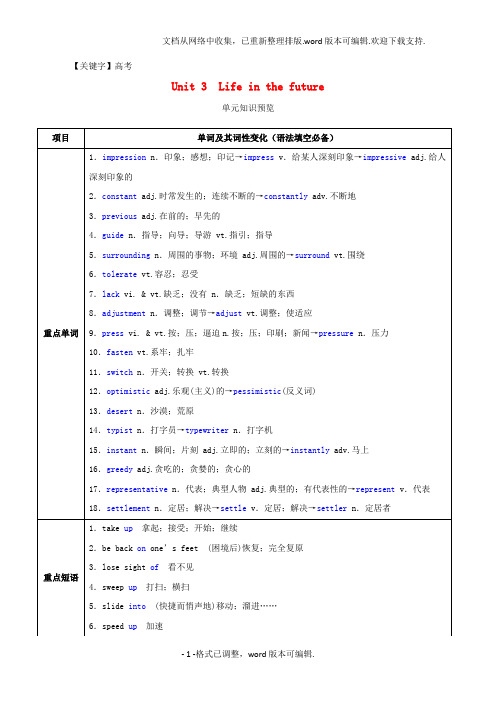
【关键字】高考Unit 3 Life in the future单元知识预览晨读范文背诵背诵这篇范文【山西省长治二中、忻州一中、临汾一中、康杰中学、晋城一中2017届高三上学期第一次联考】假定你是高中学生李华,你的美国朋友Jim即将升入高中,想让你给他一些学习建议。
请你给他写一封电子邮件,内容包括:1. 与老师交流,征求老师意见;2. 上课积极参与讨论,专心听讲,做好笔记;3. 课后积极完成作业,巩固知识。
注意:1.词数100左右; 2.可以适当增加细节,以使行文连贯。
语言知识精析重点单词精讲考点1.impression n. 印象;感觉;感想;印记【教材原句】first impressions第一印象【例句研读】(1) What was your first impression of London?你对伦敦的第一印象是什么?(2) I have a good impression of him.我对他的印象很好。
【归纳拓展】【即时巩固】(1) The new teacher made a good impression __________the students.新老师给学生们留下了一个好印象。
(2) My first __________of him was that he was a kind and thoughtful young man.我对他的第一印象是他是一个善良、体贴的年轻人。
(3) It is an ______________ achievement.那是个了不起的成就.(4) His trip to India a strong impression on him.他的印度之旅给他留下了深刻的印象。
【答案】(1) on (2) impression (3) impressive (4) made考点2.previous adj.在前的;早先的;先前的;以往的;(时间上)稍前的【教材原句】This is similar to the “jet lag” you get from flying,but it seems you keep getting flashbacks from your previous time period. 这有点像坐飞机时的飞行时差,但不同的是,你的脑海中似乎在不断闪现以前的时光。
高中英语必修五 Unit 3 Life in the future词汇拓展及巩固
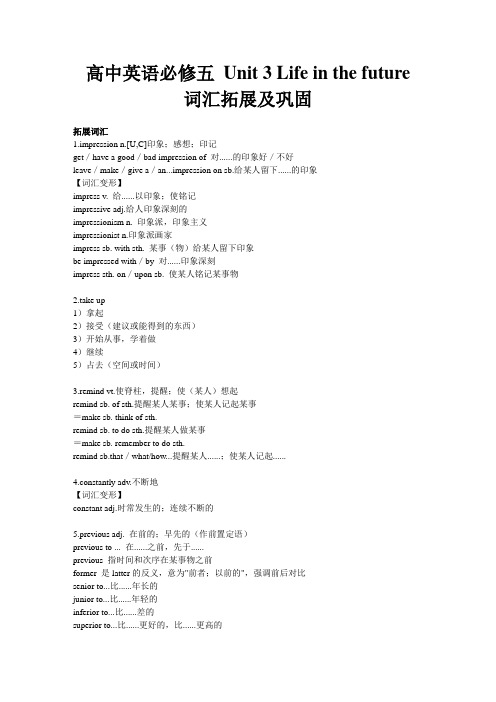
高中英语必修五Unit 3 Life in the future词汇拓展及巩固拓展词汇1.impression n.[U,C]印象;感想;印记get/have a good/bad impression of 对......的印象好/不好leave/make/give a/an...impression on sb.给某人留下......的印象【词汇变形】impress v. 给......以印象;使铭记impressive adj.给人印象深刻的impressionism n. 印象派,印象主义impressionist n.印象派画家impress sb. with sth. 某事(物)给某人留下印象be impressed with/by 对......印象深刻impress sth. on/upon sb. 使某人铭记某事物2.take up1)拿起2)接受(建议或能得到的东西)3)开始从事,学着做4)继续5)占去(空间或时间)3.remind vt.使脊柱,提醒;使(某人)想起remind sb. of sth.提醒某人某事;使某人记起某事=make sb. think of sth.remind sb. to do sth.提醒某人做某事=make sb. remember to do sth.remind sb.that/what/how...提醒某人......;使某人记起......4.constantly adv.不断地【词汇变形】constant adj.时常发生的;连续不断的5.previous adj. 在前的;早先的(作前置定语)previous to ... 在......之前,先于......previous 指时间和次序在某事物之前former 是latter的反义,意为"前者;以前的",强调前后对比senior to...比......年长的junior to...比......年轻的inferior to...比......差的superior to...比......更好的,比......更高的similar to...与......相似prior to...比......优先6.uncertain adj.不确定的;无把握的be uncertain about/of 对......不确定,对......拿不准【词汇变形】uncertainly adv.犹豫地,迟疑地uncertainty n.犹豫,迟疑;无把握7. guide n.&vt.1)n.[C]向导,导游;指南,手册;指导2)vt.指引;指导guide sb.to/through/around...领着某人到/穿过/参观......8.surroundings n.环境;周围的事物【词汇辨析】surroundings 自然环境environment 自然环境或精神环境【词汇变形】surrounding adj.周围的surround vt. 包围;环绕9.tolerate vt.1)容忍;忍受=bear/stand/put up with+doing2)(对药物)有耐受性,能经受住(困难条件)【词汇变形】tolerant adj.宽容的,容忍的tolerance n.忍受,容忍,宽容10.as though=as if 好像虚拟语气时1)与现在事实相反,从句谓语动词用过去式(be动词用were)2)与过去事实相反,从句谓语动词用had+过去分词3)与将来事实相反,从句谓语动词用would/could/might+动词原形ck n.&v.1)n.[U]缺乏;[C]短缺的东西(a)lack of 缺乏for lack of 因缺乏(have/there's)no lack of不缺少2)v. 缺乏;没有【词汇辨析】lack [U]缺乏,[C]缺乏之物。
高中英语必修五知识讲解 Unit 3 Life in the future语言点
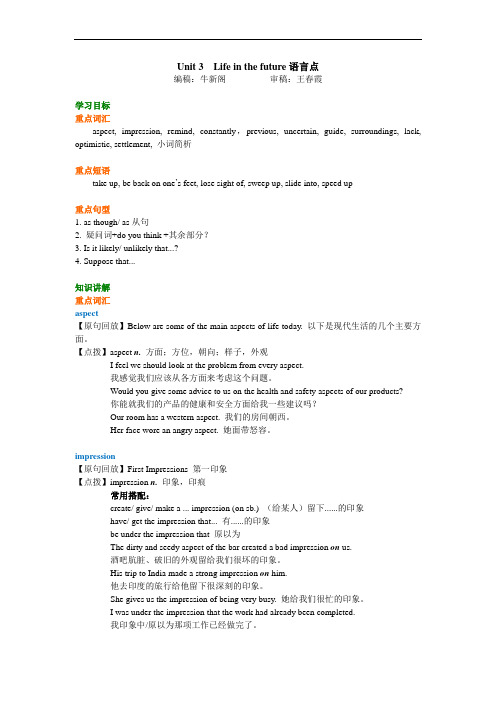
Unit 3 Life in the future语言点编稿:牛新阁审稿:王春霞学习目标重点词汇aspect, impression, remind, constantly,previous, uncertain, guide, surroundings, lack, optimistic, settlement, 小词简析重点短语take up, be back on one’s feet, lose sight of, sweep up, slide into, speed up重点句型1. as though/ as从句2. 疑问词+do you think +其余部分?3. Is it likely/ unlikely that...?4. Suppose that...知识讲解重点词汇aspect【原句回放】Below are some of the main aspects of life today. 以下是现代生活的几个主要方面。
【点拨】aspect n.方面;方位,朝向;样子,外观I feel we should look at the problem from every aspect.我感觉我们应该从各方面来考虑这个问题。
Would you give some advice to us on the health and safety aspects of our products?你能就我们的产品的健康和安全方面给我一些建议吗?Our room has a western aspect. 我们的房间朝西。
Her face wore an angry aspect. 她面带怒容。
impression【原句回放】First Impressions 第一印象【点拨】impression n.印象,印痕常用搭配:create/ give/ make a ... impression (on sb.) (给某人)留下......的印象have/ get the impression that... 有......的印象be under the impression that 原以为The dirty and seedy aspect of the bar created a bad impression on us.酒吧肮脏、破旧的外观留给我们很坏的印象。
英语:必修5-Unit3-Life-in-the-future知识点剖析(人教新课标)

Unit 3 Life in the future (知识点剖析)(一)单词·巧记·典句·考点1. vehicle[v'i:ikl]n.交通工具;车辆【巧记提示】词根vect,“传送;运载”。
【经典例句】The street is dominated by car vehicles.街道上满是车辆。
【考点聚焦】1)vehicle 特指陆地上的交通工具。
2)vehicle还可以指“(思想、情报的)传达手段、媒介”,如:This radio station has become a vehicle for conservative opinion.这家电台已成为保守派意见的传播管道。
3)常见同义词有conveyance n.运输;财产让与;运输工具;carriage n.四轮马车;客车2. private[p'rivit] adj.私人的;私有的【巧记提示】priv(单独;个别;私下)+-ate(具有或显示某性质)。
【经典例句】This is private parking lot, you cannot park here.这是私人的停车点,你不能在这里停车。
【考点聚焦】1)固定搭配:in private 秘密的;不公开的;私下的反义词:in public 公开的;公众的2)同根词:privacy n.私生活;隐私如:Telling that on TV was invasion of her privacy.在电视上谈论那件事侵犯了她的隐私权。
']n.印象;感想;印记3. impression[im pre【巧记提示】im(置于某状态或条件中;向内)+press(给……以压力)+ion(表示行为;行为的状态或结果)【经典例句】His speech made quite an impression on the audience.他的演说给听众留下了相当好的印象。
高中英语-Unit_3_Life_in_the_futureAlnMHK
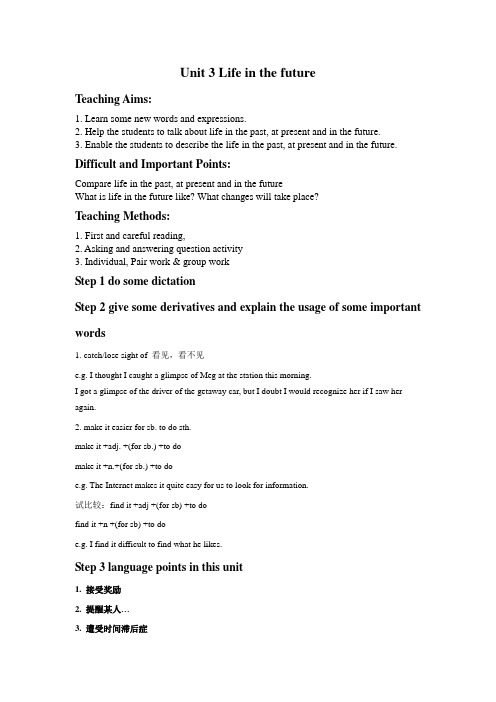
Unit 3 Life in the futureTeaching Aims:1. Learn some new words and expressions.2. Help the students to talk about life in the past, at present and in the future.3. Enable the students to describe the life in the past, at present and in the future. Difficult and Important Points:Compare life in the past, at present and in the futureWhat is life in the future like? What changes will take place?Teaching Methods:1. First and careful reading,2. Asking and answering question activity3. Individual, Pair work & group workStep 1 do some dictationStep 2 give some derivatives and explain the usage of some important words1. catch/lose sight of 看见,看不见e.g. I thought I caught a glimpse of Meg at the station this morning.I got a glimpse of the driver of the getaway car, but I doubt I would recognize her if I saw her again.2. make it easier for sb. to do sth.make it +adj. +(for sb.) +to domake it +n.+(for sb.) +to doe.g. The Internet makes it quite easy for us to look for information.试比较:find it +adj +(for sb) +to dofind it +n +(for sb) +to doe.g. I find it difficult to find what he likes.Step 3 language points in this unit1. 接受奖励2. 提醒某人…3. 遭受时间滞后症4. 放松地躺着5. 几乎没有氧气剩下6. 努力调整适应新环境7. 匆忙将我送到附近的一个西奥房间休息8.立即;马上9.恢复10.从地板下11.把食物摆在桌子12.爬上床13.熟睡14.加速15.打扫;横扫16.建立太空站17.地球重心的引力18.前沿的发明19.排除杂念20.处理掉21.被…吸引22.工作实践23.给机器人设计程序让它们完成工作1. take up my prize2. remind… that…3. suffer from “time lag”4. lie relaxed5. have little oxygen left6. make the necessaryadjustment to this newsituation7. hurry me through to a small room nearby for a rest8.in no time9.be back on one’s feet10.From under the floor11.Spread some food on the table12.slide into bed13.fall fast asleep14.speed up15.sweep up16.set up a space station17.the pull of t he earth’s gravity18.the up-to-date inventions19.clear your mind20.be disposed of21.be absorbed by22.work practice23.program robots to perform tasksStep 4. review the usage of Past Participle as Adverbial and Attribute教学反思:本单元复习后发现1学生的科普知识有点缺乏,他们平时把大部分时间都放在课本的学习上,很少读课外书。
人教版高中英语《Unit 3 Life in the future》精选教案

人教版高中英语《Unit 3 Life in the future》精选教案人教版高中英语《Unit 3 Life in the future》精选教案本单元教学内容为人教版新课标Module 5 Unit 3 Life in the future。
本单元的中心话题是"未来生活",教材内容为学生提供了想象的空间,旨在培养学生预测未来的能力,通过对现实生活与未来生活的对比,唤醒学生把握现在,珍惜现在,爱护环境,保护自然的意识。
下面就和本文库一起看看有关人教版高中英语《Unit 3 Life in the future》精选教案。
人教版高中英语必修5《Unit 3 Life in the future》教案1Step 1 Revision1 Check the homework exercises.2 Ask the Ss a few random questions to revise future time and introduce the topic of the unit. For example: What lessons do you have this afternoon / tomorrow Are you going to do anything special this evening What do you think the weather will be like tomorrow What are you going to do on Saturday evening Are you planning to do anything on SundayStep 2 PresentationSB Page 25, Part 1. Ask questions about the picture, and get Ss to tell you what they think is happening. Teach the new words majority,goods, industry. Read the introduction aloud.Step 3 ReadingSay Now read the dialogue silently and find out this information: What is being planned at this company Allow the Ss a few moments to carry out the task. Check the answer. (A new factory may be built.) See if the Ss can guess the meaning of out of work.Step 4 DialogueSpeech Cassette Lesson 65. Play the tape of the dialogue for the Ss to listen and follow. Go through the dialogue briefly and make sure the Ss understand it. Ask questions like these: What are people at the companytalking about Who is going to make the decision Why does the company need to build a new factory What is the difficulty Why do some people want the new factory to be built Why are some people against the new factory Explain that may have plans expresses uncertainty about the future. Play the tape again. This time the Ss listen and repeat. Then let the Ss practise the dialogue in pairs. You may wish to ask one pair to act the scene in front of the class.Notes:a People have been talking of it a lot recently.:Note the Present Perfect Continuous Tense to express an activity which started in the past and is still continuing.b I simply don"t know. =I honestly don’t know.c Right now =At this momentd The problem is … it. =Finding land for building the new factory is a problem ( i.e. difficult).e The majority of people =Most peoplef a number of people =quite a lot of peopleg out of work =do not have jobsh But some people … built on. =Some people do not want them to build a factory on good farm land. Note the structure not want something to be done.i I can see the problem. =I understand the problem.j is likely to happen =will probably happenk It"s quite likely: Quite emphasizes likely and increases the possibility.Step 5 PracticeSB Page 25, Part 2. Demonstrate how to make sentences from the table,then get a few Ss to make example sentences. Then let the Ss do this exercise in pairs. At the end get Ss to write down 5 sentences from thistable in their exercise books.Step 6 WorkbookWb Lesson 65, Exx. 1 - 4.After Ex. 1 is done orally, get the Ss to write the answers in their exercise books.Both Exx. 2 and 3 should be done in pairs first. Then check the answers with the class. Get Ss to translate the sentences into Chinese and ask them to think if they will be able to put them back into English. Pay attention to the sentence structures.When doing Ex. 4, warn the Ss not to do word for word translation. Special attention should be paid to the sentence patterns and word order. Step 7 ConsolidationWith a good class you can give the Ss the following phrases and get them to make up a dialogue. Write these phrases on the Bb.I believe you’re right.What are the problems thenWhat do you think is likely to happenWrite them up on the Bb and demonstrate with a good S how it is possible to make up a dialogue.A: I think the company will buy more land.B: I believe you"re right.A: But it isn’t likely that the manager will make a decision soon. B: What are the problems thenWith an ordinary class, just practise the dialogue in Part 1 again. HomeworkFinish off the Workbook exercises.Do Ex. 1 and part of Ex. 4 as written work.人教版高中英语必修5《Unit 3 Life in the future》教案2本教学设计在新课程教学理念的指导下,力求在培养学生的语言知识、知识技能、情感态度、学习策略和文化意识等素养的基础上发展学生综合运用语言的能力,使学生通过观察、体验、探究等主动学习的方法优化英语学习方法,充分发挥自己的学习潜能,形成有效的学习策略。
高中英语 Unit 3 Life in the future Period
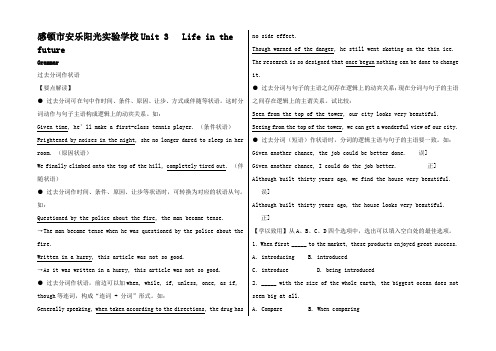
感顿市安乐阳光实验学校Unit 3 Life in the futureGrammar过去分词作状语【要点解读】● 过去分词可在句中作时间、条件、原因、让步、方式或伴随等状语。
这时分词动作与句子主语构成逻辑上的动宾关系。
如:Given time, he’ll make a first-class tennis player. (条件状语)Frightened by noises in the night, she no longer dared to sleep in her room. (原因状语)We finally climbed onto the top of the hill, completely tired out. (伴随状语)● 过去分词作时间、条件、原因、让步等状语时,可转换为对应的状语从句。
如:Questioned by the police about the fire, the man became tense.→The man became tense when he was questioned by the police about the fire.Written in a hurry, this article was not so good.→As it was written in a hurry, this article was not so good.● 过去分词作状语,前边可以加when, while, if, unless, once, as if, though等连词,构成“连词 + 分词”形式。
如:Generally speaking, when taken according to the directions, the drug has no side effect.Though warned of the danger, he still went skating on the thin ice. The research is so designed that once begun nothing can be done to change it.● 过去分词与句子的主语之间存在逻辑上的动宾关系;现在分词与句子的主语之间存在逻辑上的主谓关系。
2019版 第一部分 必修5 Unit 3 Life in the future
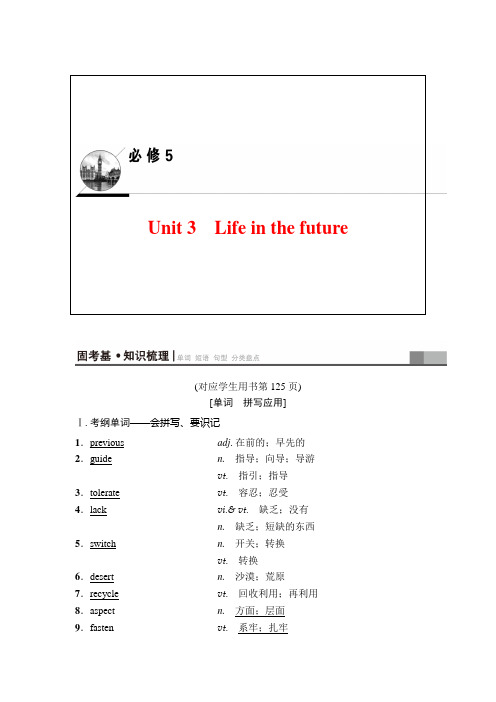
(对应学生用书第125页)[单词拼写应用]Ⅰ.考纲单词——会拼写、要识记1.previous adj.在前的;早先的2.guide n. 指导;向导;导游vt. 指引;指导3.tolerate vt. 容忍;忍受4.lack vi.& vt. 缺乏;没有n. 缺乏;短缺的东西5.switch n. 开关;转换vt. 转换6.desert n. 沙漠;荒原7.recycle vt. 回收利用;再利用8.aspect n. 方面;层面9.fasten vt. 系牢;扎牢10.flash v t.&v i.(使)闪光;(使)闪现11.timetable n. 时间表;时刻表12.citizen n. 公民;居民;市民13.button n. 纽扣;按钮14.ecology n. 生态;生态学15.greedy adj. 贪吃的;贪婪的;贪心的16.swallow vt. 吞下;咽下17.material n. 原料;材料18.goods n. 货物Ⅱ.派生单词——能辨别1.impress v.使留下深刻印象→impressive adj.给人深刻印象的→impression n.印象;感想;印记2.constant adj.时常发生的;连续不断的→constantly ad v.不断地3.certain adj.某一;必然的;确信的→uncertain adj.不确切的;无把握的→certainly ad v.当然;行(用于回答)4.surround v t.围绕→surrounding adj.周围的→surroundings n.周围的事物;环境5.adjust v t.调整;使适应→adjustment n.调整;调节6.press v i.& v t.按;压;逼迫n.按;压;印刷;新闻→pressure n.压力7.optimism n.乐观主义→optimistic adj.乐观(主义)的8.mud n.泥(浆)→muddy adj.泥泞的9.instant n.瞬间;片刻adj.立即的;立刻的→instantly ad v.马上10.settle v.定居;解决→settlement n.定居;解决11.motivate v t.刺激;使有动机;激发……的积极性→motivated adj.有动机的;有积极性的→motivation n.动机Ⅲ.语境应用(用所给词的适当形式填空)1.He walked in the surrounding villages and found the surroundings very comfortable to live in.(surround)2.We've got to motivate our students,because the stronger the motivation is,the more quickly a person will learn a foreign language.(motivate)3.The city of Hangzhou is really an impressive place.Especially the famous West Lake always leaves quite an impression on the visitors.I was strongly impressed by its beauty the first time I visited it.(impress)【导学号:65670100】[拓展联想]Ⅰ.短语回顾——会默写1.take_up拿起;接受;开始;继续2.be_back_on_one's_feet (困境后)恢复;完全复原3.lose_sight_of...看不见……4.sweep_up 打扫;横扫5.slide_into (快捷而悄声地)移动;溜进……6.speed_up 加速7.remind_sb.of...使某人想起……8.be_similar_to 与……相似9.in_all_directions 四面八方10.show_sb.around 带领某人参观……Ⅱ.语境应用(选用上述短语的适当形式填空)1.Tom thought carefully for several days and decided to take_up the job. 2.Nobody noticed when he entered the classroom;he slid_into it from the back door. 3.Don't leave her alone to sweep_up the house after the party.4.Many countries are faced with the problem about how to speed_up economic development.5.I watched the plane go higher and higher until I lost_sight_of it.[拓展联想][句式结构仿写](对应学生用书第126页)精讲3个考纲单词lack vt .&vi .缺乏;没有n .缺乏;短缺的东西[高考佳句] They lack physical exercise and the skill to communicate with their friends face to face .(重庆高考)他们缺乏身体锻炼和面对面与朋友交流的能力。
人教版高中英语必修四Unit3 Life in the future课文全解(常考单词、高频短语和写作句式)
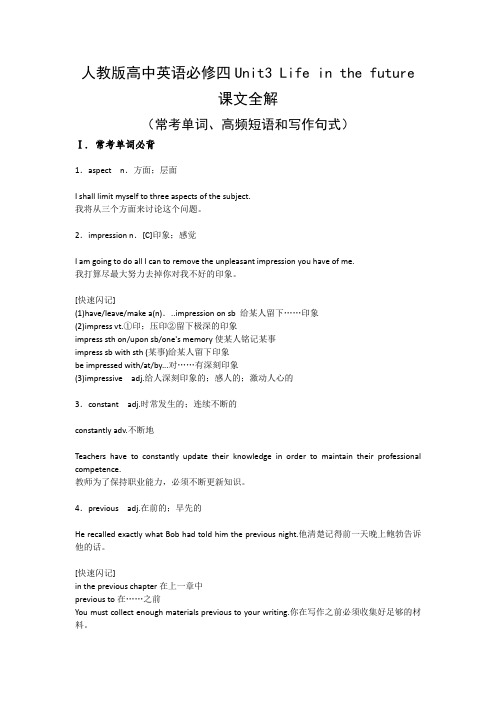
人教版高中英语必修四Unit3 Life in the future课文全解(常考单词、高频短语和写作句式)Ⅰ. 常考单词必背1.aspect n.方面;层面I shall limit myself to three aspects of the subject.我将从三个方面来讨论这个问题。
2.impression n.[C]印象;感觉I am going to do all I can to remove the unpleasant impression you have of me.我打算尽最大努力去掉你对我不好的印象。
[快速闪记](1)have/leave/make a(n)...impression on sb 给某人留下……印象(2)impress vt.①印;压印②留下极深的印象impress sth on/upon sb/one's memory使某人铭记某事impress sb with sth (某事)给某人留下印象be impressed with/at/by...对……有深刻印象(3)impressive adj.给人深刻印象的;感人的;激动人心的3.constant adj.时常发生的;连续不断的constantly adv.不断地Teachers have to constantly update their knowledge in order to maintain their professional competence.教师为了保持职业能力,必须不断更新知识。
4.previous adj.在前的;早先的He recalled exactly what Bob had told him the previous night.他清楚记得前一天晚上鲍勃告诉他的话。
[快速闪记]in the previous chapter在上一章中previous to在……之前You must collect enough materials previous to your writing.你在写作之前必须收集好足够的材料。
高中英语 (Unit3 Life in the future Period 4)优秀教案 新人教版必
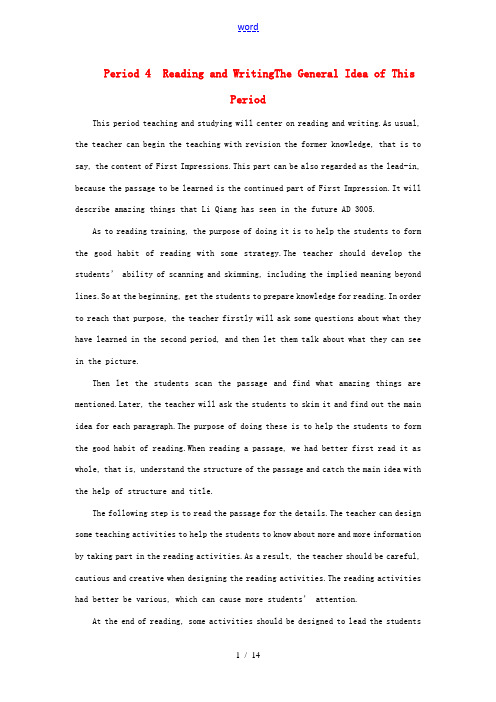
Period 4 Reading and WritingThe General Idea of ThisPeriodThis period teaching and studying will center on reading and writing.As usual, the teacher can begin the teaching with revision the former knowledge, that is to say, the content of First Impressions.This part can be also regarded as the lead-in, because the passage to be learned is the continued part of First Impression.It will describe amazing things that Li Qiang has seen in the future AD 3005.As to reading training, the purpose of doing it is to help the students to form the good habit of reading with some strategy.The teacher should develop the students’ ability of scanning and skimming, including the implied meaning beyond lines.So at the beginning, get the students to prepare knowledge for reading.In order to reach that purpose, the teacher firstly will ask some questions about what they have learned in the second period, and then let them talk about what they can see in the picture.Then let the students scan the passage and find what amazing things are ter, the teacher will ask the students to skim it and find out the main idea for each paragraph.The purpose of doing these is to help the students to form the good habit of reading.When reading a passage, we had better first read it as whole, that is, understand the structure of the passage and catch the main idea with the help of structure and title.The following step is to read the passage for the details.The teacher can design some teaching activities to help the students to know about more and more information by taking part in the reading activities.As a result, the teacher should be careful, cautious and creative when designing the reading activities.The reading activities had better be various, which can cause more students’ attention.At the end of reading, some activities should be designed to lead the studentsto understand the implied meaning beyond the passage.At the same time, let the students consider the writing purpose, which serves the purpose of the author writing it.Besides reading, the class is also expected to learn and practise writing skill.By studying the passage, the students should learn the ability of describing the things and what they imagine imitating the passage.The teacher should give the students some advice on how to succeed in describing the things and what they imagine.Teaching Important PointsMaster the skill of gist reading.Develop the students’ ability of understanding the implied meaning.Improve the students’ writing ability.Teaching DifficultiesDevelop the students’ ability of understanding the implied meaning.Teaching AidsMulti-media classroom and other normal teaching toolsThree Dimensional Teaching AimsKnowledge AimsGet the students to know about what Li Qiang found in the future in AD 3005.Learn the knowledge about how to write a passage about description of the things.Ability AimsMaster the skill of gist reading.Develop the students’ ability of understanding the implied meaning.Improve the students’ writing ability.Emotional AimsReading the passage is to attempt to cultivate students’ spirit of exploring science and future.Teaching ProcedureStep 1 GreetingT: Hello, my friends.Ss: Hello, Miss Wang.Step 2 RevisionT: Do you still remember what we learned in the second period?S: First Impressions.T: How did Li Qiang travel to the earth in AD 3005?S: With the help of his friend, he traveled by time capsule to the earth but one thousand years in the future.T: How did he feel when he found him in a pletely strange world?S: He was confused by the new surroundings.T: Good.Now let’s make some sentences with“Li Qiang〞to describe what he saw and experienced.S: Li Qiang suffered from the lack of fresh air on his arrival at the new world in the future.S: Li Qiang felt much better after putting on a special mask, though the air seemed thin there.S: Li Qiang got separated from his friend when they reached what looked like a large market.Ss: ...Step 3 Pre-readingT: You did a good job.Most of you reviewed what we learned.Now let us guess what Li Qiang would go on visiting.S: He was to visit other planets by time capsule.S: I guess he would go to visit some interesting places.S: I think he would pay a visit to a family and a school.Ss: ...T: If you were the author of the passage, what would you like to introduce to readers?S: I might introduce the aliens who he met in the future.S: I think I would describe the way of future life.S: If I were the author, I would prefer to write something about future school.T: Some students seem to have the same opinion as the author, while some might be able to write a new passage for us to enjoy.I am glad to know you all have used your heads to have various answers.Now study the picture on Page 21 to tell me what you can see in the picture.S: I can see a strange thing is working in a special place.S: The strange thing has six hands and one leg, but its head is similar to ours.S: There is another creature, which is very small with many hands, pared with the big one.Ss: ...Step 4 Fast ReadingT: Now let us read the title together.T: Can you predict what the passage may be about?S: It may be about what he had seen, especially about the amazing things in the future.T: You are right.As we all know, the best title is the one which can show the main idea of the reading passage.As a consequence, we should read the title when we begin to read one, which will help us to understand a passage.Now, read the passage quickly to find what amazing things are mentioned in it.(After one minute.)S: a pace station, some alien creatures, mu-mu, dimpodsT: Yes.Please look through it again and find out main idea for eachparagraph.You’d better finish it in two minutes.(Two minutes later, ask the students to show their opinion to the whole class.Then discuss it and decide the best answer.The teacher should tell them the answer in the end.)Suggested answers:Para.1 a space station considered the most modern in this part of spacePare.2 the friendliest creatures, mu-muPara.3 the most interesting creatures, dimpodsPara.4 the differences and similarities between themStep 5 Careful ReadingT: Please read Para.one and answer the questions: Where did he first visit?Describe the place.(After one minute.)S: His first visit was to a space station considered the most modern in this part of space.It is an enormous round plate, and it spins slowly in space to imitate the pull of the earth’s gravity.Inside of it, it is divided into zones with extraordinarily differ atmospheres and gravities.T: Right.What other strange things can be found?S: There live the alien creatures while they work with human space scientists searching for new worlds.T: Now please read the next two paragraphs to tell the following sentences true or false.1.The friendliest creatures are the tiny dimpods, while the most interesting creatures are the mu-mu.2.The mu-mu must wear red nightlights on the helmets so that they can see in the dark.3.The World Space Agency will send a spaceship to examine the fourth star inthe Pleiades system next year.4.The mu-mu can skip around the pipes and between the wooden walls of the space station.5.The tiny dimpods are great engineers, which require the same the same atmospheres as humans.6.The tiny dimpods van produce a liquid from their bodies, which melts metal and very useful for the outside for spaceships.(Give students four minutes to read and consider the statements.)T: Let’s check the answers.If it is wrong, please correct it.S: 1.I think the first sentence is wrong.The two objects should be exchanged.That is to say, the friendliest creatures are the mu-mu, while the most interesting creatures are the tiny dimpods.T: Right.What about the next?S: 2.It is false.Human beings must wear red nightlights on the helmets so that they can see in the dark.But the mu-mus don’t need it because they can see in the dark.T: Good.Is the third one wrong?S: 3.I think it is right.T: Right.What about the next one?S: 4.It is wrong.The tiny dimpods can skip round the pipes and between the wooden walls of the space station.T: I agree with you.S: 5.The fifth and the sixth are right.T: Excellent.Now, let’s read the last paragraph and bine what we just read to finish the following chart.Name of creature Mu-mu Dimpods1.They see in the dark so they live in an area without light of any kind.2.They are clever so that they have assisted in the scientific discovery.3.They are not easy to talk to so that you have to use a language-changer to help.The mu-mus only speak in whispers.4.They eat food that contains carbon and drink a strange mixture of carrot juice and cocoa. 1.They require the same atmosphere as humans.2.They are great engineers and very clever.3.They are able to travel many light years away from the earth, which can produce a strange liquid from their bodies.4.They are difficult to talk to so that you have to use a language-changer to help.The dimpods shout loudly in your ear.5.They eat food that contains carbon, which drink lemonade mixed with herbs.shell-covered leg. space station.Step 6 Post-readingT: What’s the main idea?S: The passage mainly tells us the strange things that he saw in the future.T: Right.What is the purpose of writing the passage?S: Writing the passage is to let us know what will happen in advance.S: I think the author attempted to encourage us to be brave enough to search for the future to speed up the development of science.T: What a clever head!We should have a creative spirit to explore the development of the future to build up our society.We should work hard to make contributions to our country, trying to make our homeland highly developed.T: Now let’s imagine to add two extra characteristics of the creatures.Discuss what an alien creature of your own might be like with your partners.(About three minutes, ask some students to describe what an alien creature might be like in their minds.)Step 7 WritingT: Just now you discuss what an alien creature of your own might be like.Now please draw a picture of your alien.Then write a description based on your drawing and the notes in the chart.Show your drawing to your classmates and read your description to them.(Give them ten minutes to do it.First, let them do it by ter get them to exchange with their deskmates.Finally ask some students to show their work to the whole class.During doing it, the teacher can design a petition to arouse their interest.If possible, get some excellent works shown to the whole school to encourage students to have a creative spirit.)Step 8 ConsolidationT: In this period, we mainly focus on reading the passage: I Have Seen AmazingThings.Would you please make a sentence with“What I have seen...〞?(In order to get more students to take part in this activity, the teacher can let them have a petition between groups.)Step 9 HomeworkT: After class write a passage titled An Alien in My Mind, imitating the passage.In your description there will be name of creature, size, appearance, color, how to move, personality and so on.The Design of the Writing on the BlackboardUnit 3 Life in the futurePeriod 4 Reading and WritingStructure parisonPara1 a space station considered the most modern in this part of space Pare 2 the friendliest creatures, mu-muPara 3 the most interesting creatures, dimpodsPara 4 the differences and similarities between them Mu-mu Dimpods SizeAppearanceColorPersonalityNumber of armsNumber of legsHow it movesResearch and ActivitiesGet the students to participate in a petition about designing the future.The theme of the petition is robots in the future home.The students are asked to work in groups of four to design the robots in their minds.They will draw the pictures of the robots and also describe the size, appearance, personality and how to work.In order to attract more attention, the designers should give a vivid description about its outstanding advantages and function.In addition to beautiful appearance andextraordinary function, the designing should also be full of imagination. The group whose description is wonderful, together with imaginative, beautiful and functional design, will be the winner.Reference for TeachingSpace program in the futureThe risk takers and visionaries of this agency have expanded human knowledge, have revolutionized our understanding of the universe, and produced technological advances that have benefited all of humanity.Inspired by all that has e before, and guided by clear objectives, today they set a new course for America’s space program.They will give NASA a new focus and vision for future exploration.They will build new ships to carry man forward into the universe, to gain a new foothold on the moon, and to prepare for new journeys to worlds beyond their own.Their current programs and vehicles for exploring space have brought them far.The Space Shuttle has flown more than a hundred missions.It has been used to conduct important research and to increase the sum of human knowledge.Shuttle crews, and the scientists and engineers who support them, have helped to build the International Space Station.Telescopes—including those in space—have revealed more than 100 planets in the last decade alone.Probes have shown them stunning images of the rings of Saturn and the outer planets of our solar system.Robotic explorers have found evidence of water—a key ingredient for life—on Mars and on the moons of Jupiter.At this veryhour, the Mars Exploration Rover Spirit is searching for evidence of life beyond the Earth.It is time for America to take the next steps.Their first goal is to plete the International Space Station by 2010.They will focus their future research aboard the station on the long-term effects of space travel on human biology.The environment of space is hostile to human beings.Radiation and weightlessness pose dangers to human health, and we have much to learn about their long-term effects before human crews can venture through the vast voids of space for months at a time.Research on board the station and here on Earth will help us better understand and overe the obstacles that limit exploration.Through these efforts we will develop the skills and techniques necessary to sustain further space exploration.The second goal is to develop and test a new spacecraft, the Crew Exploration Vehicle, by 2008, and to conduct the first manned mission no later than 2014.The Crew Exploration Vehicle will be capable of ferrying astronauts and scientists to the Space Station after the shuttle is retired.But the main purpose of this spacecraft will be to carry astronauts beyond our orbit to other worlds.This will be the first spacecraft of its kind since the Apollo mand Module.The third goal is to return to the moon by 2020, as the launching point for missions beyond. Beginning no later than 2008, they will send a series of robotic missions to the lunar surface to research and prepare for future human ing the Crew Exploration Vehicle, they will undertake extended human missions to the moon as early as 2015, with the goal of living and working there for increasingly extended periods.With the experience and knowledge gained on the moon, man will then be ready to take the next steps of space exploration: human missions to Mars and to worlds beyond.Yet the human thirst for knowledge ultimately cannot be satisfied by even the most vivid pictures, or the most detailed measurements. And only human beingsare capable of adapting to the inevitable uncertainties posed by space travel.GalaxyAny of the systems of stars and interstellar matter makes up the Cosmos.Many such assemblages are so enormous that they contain hundreds of billions of stars.Nature has provided an immensely varied array of galaxies, ranging from faint, diffuse dwarf objects to brilliant, spiral-shaped giants.Virtually all galaxies appear to have been formed soon after the universe began, and they pervade space, even into the depths of the farthest reaches penetrated by powerful modern telescopes.Galaxies usually exist in clusters, some of which in turn are grouped into larger clusters measuring hundreds of millions of light-years across.(A light-year is the distance traversed by light in one year, traveling at a velocity of 300 000 kilometers per second, or 650 000 000 miles per hour.) These so-called super clusters are separated by nearly empty voids, causing the gross structure of the universe to look somewhat like a network of sheets and chains of galaxies.Galaxies differ from one another in shape, with variations resulting from the way in which the systems were formed.Depending on the initial conditions in the pregalactic gas some 15 000 000 000 years ago, galaxies formed either as slowly turning, smoothly structured, round systems of stars and gas or as rapidly rotating pinwheels of such entities.Other differences between galaxies have been observed and are thought to reflect evolutionary changes.Some galaxies are rife with activity: they are the sites of star formation with its attendant glowing gas and clouds ofdust and molecular plexes.Others, by contrast, are quiescent, having long ago ceased to form new stars.Perhaps the most conspicuous evolutionary changes in galaxies occur in their nuclei, where evidence suggests that in many cases super massive objects—probably black holes—formed when the galaxies were young.Such phenomena occurred several billion years ago and are now observed as brilliant objects called quasars.The existence of galaxies was not recognized until the early 20th century.Since then, however, galaxies have bee one of the focal points of astronomical investigation.The notable developments and achievements in the study of galaxies are surveyed here.Included in the discussion are the external galaxies (i.e., those lying outside the Milky Way Galaxy, the local galaxy to which the Sun and Earth belong), their distribution in clusters and super clusters, and the evolution of galaxies and quasars.For further details on the Milky Way Galaxy, see Milky Way Galaxy.For specifics about the ponents of galaxies, see star, nebula, and Cosmos.A future vehicleWhile many technological advances occur in an evolutionary manner, occasionally a revolutionary technological appears on the horizon that creates startling new conditions and profound changes.Such is the case with the privately developed Moller Skycar, which is named after its inventor.The LAMV is a vertical take-off and landing aircraft that can fly in a quick, quiet, and agile manner.It is a new type of vehicle that bines the speed of an airplane and the vertical take-off capability of a helicopter with some characteristics of a ground vehicle, but without the limitations of any of those existing modes of transportation.The LAMV is not operated like traditional fixed—or rotary-wing aircraft.It has only two hand-operator uses to direct the redundant puter control twists to select the desired operating altitude and moves fore and aft to select the rate of climb.Theright-hand control twists to select the vehicle’s direction and moves side-to-side to provide transverse (crosswise) movement during the hover and early-transition-to-flight phases of operation; it also moves fore and aft to control speed and braking.Simply put, the LAMV is user friendly.The LAMV of the future will be 18 feet long, 10 feet wide, and 6 feet high and weight 2200 pounds.It will hold four passengers and a payload of 875 pounds (including fuel).The vehicle will have a maximum rate of climb of 6400 feet per minute and an operational ceiling of 30 000 feet.It will attain a top speed of 390 miles per hour at an altitude of 6000 feet and a cruising speed of 350 miles per hour at 25 000 feet, and it will have a maximum range of 900 miles at 80 passenger miles per gallon.The LAMV also will be quiet enough to function as an acoustic“stealth〞plane at 500 feet.It will have a vertical take-off and landing capability and emergency airframe parachutes, and it will be capable of using various fuels.The potential economic advantages of the LAMV are worth mentioning.Its fuel-efficient engines and ability to operate on various fuels will low fuel costs.The LAMV uses one-fourth of the fuel per passenger mile used by the tilt-rotor V-22 Osprey or high performance helicopters.The LAMV’s potential military uses will be numerous.However, once the LAMV technology matures, its military possibilities are startling.We in the Army bat ser vice support“futures〞arena are encouraged by the developments so far and hope that the LAMV will be ready for Army fielding around 2010.The LAMV can bee a reality in our Army and possibility in the other armed services as well.Without any doubt, this technological innovation will succeed internationally inn the private, mercial, and military sectors.I hope that the US Army will be the first army in the world to embrace and exploit this technology.But sooner rather than later, this aerial vehicle technology will affect all of our lives.It is just over the horizon.。
人教版高中英语必修五Unit3 Life in the future.doc
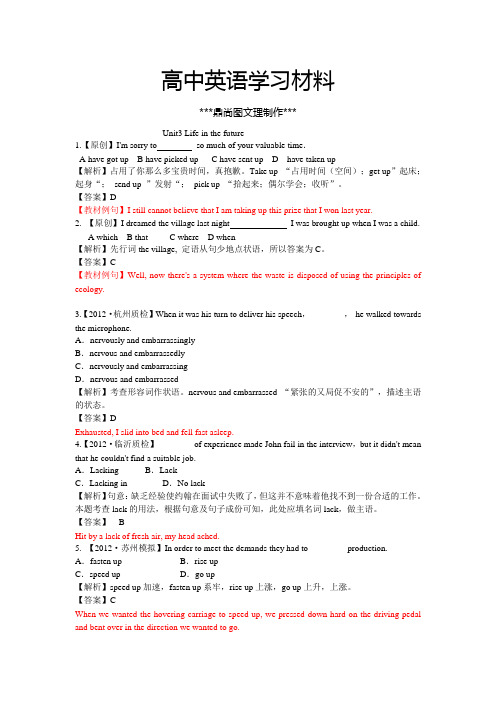
高中英语学习材料***鼎尚图文理制作***Unit3 Life in the future1.【原创】I'm sorry to so much of your valuable time.A have got upB have picked upC have sent upD have taken up【解析】占用了你那么多宝贵时间,真抱歉。
Take up “占用时间(空间);get up”起床;起身“;send up ”发射“;pick up “拾起来;偶尔学会;收听”。
【答案】D【教材例句】I still cannot believe that I am taking up this prize that I won last year.2. 【原创】I dreamed the village last night I was brought up when I was a child.A whichB thatC whereD when【解析】先行词the village, 定语从句少地点状语,所以答案为C。
【答案】C【教材例句】Well, now there's a system where the waste is disposed of using the principles of ecology.3.【2012·杭州质检】When it was his turn to deliver his speech,________,he walked towards the microphone.A.nervously and embarrassinglyB.nervous and embarrassedlyC.nervously and embarrassingD.nervous and embarrassed【解析】考查形容词作状语。
nervous and embarrassed “紧张的又局促不安的”,描述主语的状态。
- 1、下载文档前请自行甄别文档内容的完整性,平台不提供额外的编辑、内容补充、找答案等附加服务。
- 2、"仅部分预览"的文档,不可在线预览部分如存在完整性等问题,可反馈申请退款(可完整预览的文档不适用该条件!)。
- 3、如文档侵犯您的权益,请联系客服反馈,我们会尽快为您处理(人工客服工作时间:9:00-18:30)。
Unit 3 Life in the future Warming up一、基础过关(每小题1分,满分20分)A. 单词拼写1. There is something wrong with your car. It r__________ repairing.2. In China many people have bought cars and the number of p_________ cars is increasing quickly.3. My s_________ is good; I don’t need glasses.4. The project had to be stopped for the l________ of money. The manager has gone to raise money.5. I have a bad t___________. I will have to get the bad tooth pulled out tomorrow.6. Only in this way can you ___________ (掌握) spoken English.7. She lives in a pleasant neighborhood and enjoys her s_____________(环境).8. There are several __________ (开关) on the wall. Can you tell me which one turns on the hall lights?9. Do you know the __________ (长度) of this bridge?10. A train is a kind of ____________ (交通工具), which is fast and safe.B. 句型转换11. A: We missed the train as a result of the heavy rain.B: It rained heavily. ______ _______ ______, we missed the train.12. A: My first visit was to a space station considered the most modern in this part of space.B: I first _______ a space station which ________ _________ the most modern in this part of space.13. A: I felt better immediately.B: I felt better _______ ________ ________.14. A: I got lost when we reached what looked like a large market because of the people flying by in all directions.B: I couldn’t ________ _______ ______ when we reached what looked like a large market _______ people flew by in all directions.15. A: Why not sit down and rest?B: Why ______ ______ sit down and rest?C. 完成句子16. Playing games on the Internet _________ _________ (占用) most of his time17. What I saw ________ ________ ________ (使我想起了) my childhood.18. When he got there, he _________ _______ ______ (看见) the ship on the sea but soon it was ______ _____ _______ (看不见了).19. Our classroom should be _________ ________ (打扫) after class every day.20. He ______ ______ (加快速度) the car in order not to be late.二、单项填空 (每小题1分,满分15分)21. My cousin doesn't know what to ______ at the university; he can't make up hismind about his future.A. take onB. take awayC. take upD. take after22. Thank you for ______ me of the important date.A. rememberingB. thinkingC. remindingD. expecting23. I advise you to take school more seriously, otherwise you’ll have to go out and work, _____.A. as a resultB. now and thenC. in a wordD. at that moment24. —Who came out _______ first in the London Marathon?—Michael. He’s always ________ first to reach the line.A. the; theB. 不填;不填C. the; 不填D. 不填; the25. When you finish reading the book .you will have ________ better understanding of ______life.A. a; theB. the; aC. 不填; theD. a; 不填26. “How could you lose so much money?” Char lie asked his wife, eyeing her angrily from______ the kitchen table.A. atB. acrossC. throughD. on27.— What was it, Ted?—Just a(n.) ___________ in my shoulder. It’s gone now.A. injuryB. acheC. woundD. pain28. John couldn’t finish his words _______ something had struck his throat.A. thoughB. as thoughC. whenD. since29. For miles around me there was nothing but a desert, without a single plant or tree ______.A. on earthB. for distanceC. in sightD. at place30. He has very sharp eyes; he can ______ sight of things quickly.A. catchB. loseC. raiseD. lower31. Do you know who provides these orphans(孤儿) _______ food and clothing?A. withB. forC. toD. of32. Christie stared angrily at her boss and turned away, as though ________ out of the office.A. wentB. to goC. goneD. would go33. The murderer has run into the mountain and the policemen are _________ him.A. searchingB. questioningC. searching forD. finding34. It rained last night and the flowers don’t require _________, so he _________ water the flowers.A. being watered; doesn’t need toB. watering; doesn’t need toC. being watering; needn’tD. watering; needn’t to35. I don’t believe that older people are always wiser. It _______ the person and what kind of experiences he or she has had.A. requires ofB. results fromC. depends onD. belongs to三、完形填空 (每小题1分,满分20分)阅读下面短文,掌握大意,然后从36-55各题所给的四个选项(A、B、C和D)中,选出最佳答案。
This report presents facts of home computer used by a group of young people. It is a common belief that teenagers today know about 36 and are familiar 37 using them in all their lives. We decided to try to 38 if this was true.We questioned thirty people between 14 and 18. All the teenagers we 39 said they had computers at home. We asked them how much time they spent on their computers in an average week, 40 we were most interested in 41 they used their computers 42 .The average time 43 on a computer in a week was about 12 hours, with the highest user average 32 hours and the lowest user 44 5 hours. There was 45 important different between boys and girls.All of the people questioned said they regularly used the computer to 46 games. Fourteen told us they did some word-progressing at home, but not very much. Only two said that computers 47 them with their studies, 48 eight people told us they kept address and telephone numbers on their computers 49 used them writing diaries. Only three people said they were learning to program computers. But 50 of the people used their computers for 51 purpose.The results make it known that average computer use is quite high 52 teenagers. They also show quite clearly that computers are seen by most young people 53 little more than game machine. The only important uses are for word-procession and organizing address lists. It 54 to us that, although computers are popular with British youths, they have not 55 become useful tools in their daily life.36. A. everything B. computersC. knowledgeD. much37. A to B. withC. forD. in38. A. find out B. discoverC. watchD. notice39. A. elected B. foundC. choseD. saw40. A. and B. soC. forD. but41. A. which B. thatC. whatD. how42. A. for B. inC. asD. with43. A. spent B. hadC. enjoyedD. used44. A. even B. moreC. exactlyD. only45. A. even B. anyC. notD. no46. A. do B. playC. makeD. invent47. A. told B. taughtC. helpedD. introduced48. A. however B. stillC. whileD. yet49. A. but B. orC. evenD. then50. A. most B. noneC. someD. all51. A. any other B. no otherC. some otherD. another52. A. with B. ofC. betweenD. among53. A. as B. likeC. the sameD. such54. A. turns B. listensC. looksD. seems55. A. too B. eitherC. yetD. still四、阅读理解 (每小题1.5分,满分30分)阅读下列短文,从每题所给的四个选项(A、B、C或D)中,选出最佳选项AThere are little cars that may some day take the place of today’s automobiles(汽车). If everyone drives such a little car in the future, there will be less pollution in the air, there will be more parking space in cities, and the streets will be less crowded. The space now for one car of the usual size can hold at least three such little cars.The little cars will cost much less to own and to drive. Driving will be safer, too, as these little cars can go only 65 kilometers an hour.The cars of the future will be fine for going around the city, but they will not be useful for going far away. If the car is powered by electricity, it will havetwo batteries—one battery for the motor and the other for the horn (喇叭), signals (信号灯), etc. Little cars which are powered by gas will go 45 kilometers before needing to stop for more gas.If big cars are still used along with the small ones, two sets of roads will be needed to set up in the future. Some roads will be used for the big, fast cars, and other roads will be needed for the small, slower ones.56. What’s the advantage (优势) of the small cars?A. There won’t be so much pollution and the small cars won’t be so expensive as the big ones.B. It will be safer to drive these small cars.C. There will be more space for cars to park.D. All of the above.57. Two sets of roads are necessary in the future in order to .A. prevent car accidentsB. make the city more beautifulC. let small cars run fastD. limit the speed of the cars58. Which of the following is true according to the passage?A. A car of the usual size now is three times as big as the small car.B. The small car with a speed of 65 kilometers an hour is much more useless than a car of the usual size.C. the little car will be safer but cost more.D. The little car will need more gas.59. The best title for this passage should be .A. Big Cars and Small CarsB. How to Drive Small CarsC. Cars for TomorrowD. Cars for EveryoneBIn 1901, H. G. Wells, an English writer, wrote a book describing a trip to the moon. When the explorers (探险者) landed on the moon, they discovered that the moon was full of underground cities. They expressed their surprise to the “moon people” they met. In turn, the “moon people” expressed their surprise. “Why?” they asked, “are you traveling to outer space when you don’t even use your inner space?”H. G. Wells could only imagine travel to the moon. In 1969, human beings really did land on the moon. People today know that there are no underground cities on the moon. However, the question that the “moon people” asked is still an intere sting one. A growing number of scientists are seriously thinking about it.Underground systems are already in place. Many cities have underground car parks. In some cities, such as Tokyo, Seoul and Montreal, there are large underground shopping areas. The “Chunnel”, a tunnel (隧道) connecting England and France, is now complete.But what about underground cities? Japan’s Taisei Corporation is designinga network of underground systems, called “Alice Cities.” The designers imagine using surface space for public parks and using underground space for flats, offices, shopping, and so on. A solar dome (太阳能穹顶) would cover the whole city.Supporters of underground development say that building down rather than building up is a good way to use the earth’s space. The s urface, they say, can be used for farms, parks, gardens, and wilderness. H. G. Wells “moon people” would agree. Would you?60. The explorers in H. G. Wells’ story were surprised to find that the “moon people” .A. knew so much about the earthB. understood their languageC. lived in so many underground citiesD. were ahead of them in space technology61. What does the underlined word “it” (paragraph 2) refer to?A. Discovering the moon’s inner space.B. Using the earth’s inner space.C. M eeting the “moon people” again.D. Traveling to outer space.62. What sort of underground systems are already here with us?A. Offices, shopping areas, power stations.B. Tunnels, car parks, shopping areas.C. Gardens, car parks, power stations.D. Tunnels, gardens, offices.63. What would be the best title for the text?A. Alice Cities—cities of the futureB. Space travel with H. G. WellsC. Enjoy living undergroundD. Building down, not upCDo you want to live another 100 years or more? Some experts say that scientific advances will one day enable humans to last tens of years beyond what is now seen as the natural limit of the human life span."I think we are knocking at the door of immortality (永生),' said Michael Zey, a Montclair State University business professor and author of two books on the future. "I think by 2075 we will see it and that's a conservative estimate (保守的估计)." At the conference in San Francisco, Donald Louria, a professor at New Jersey Medical School in Newark said advances in using genes as well as nanotechnology (纳米技术) make it likely that humans will live in the future beyond what has been possible in the past. "There is a great push so that people can live from I20 to 180 years," he said. "Some have suggested that there is no limit and that people could live to 200 or 300 or 500 years."However, many scientists who specialize in ageing are doubtful about it and say the human body is just not designed to last past about 120 years. Even with healthierlifestyles and less disease, they say failure of the brain and organs will finally lead all humans to death.Scientists also differ on what kind of life the super aged might live. "It remains to be seen if you pass 120, you know; could you be healthy enough to have good quality of life?" said Leonard Poon, director of the University of Georgia Gerontology Centre. "At present people who could get to that point are not in good health at all."64. By saying "we are knocking at the door of immortality", Michael Zey means _______.A. they believe that there is no limit of livingB. they are sure to find the truth about long livingC. they have got some ideas about living foreverD. they are able to make people live past the present life span65. Donald Louria’s attitude t owards long living is that _______.A. people can live from 120 to 180B. it is still doubtful how long humans can liveC. the human body is designed to last past about 120 yearsD. it is possible for humans to live longer in the future66. The underlined "it" ( paragraph 4 ) refers to ________.A. a great pushB. the idea of living beyond the present life spanC. the idea of living from 200 to 300 yearsD. the conservative estimate67. What would be the best title for this text?A. Living Longer or NotB. Science, Technology and Long LivingC. No Limit for Human LifeD. Healthy Lifestyle and Long LivingDThe year is 2094. It has been announced that a comet (彗星) is heading towards the Earth . Most of it will miss our planet, but two pieces will probably hit the southern half of the Earth.On 17 July , a piece four kilometers wide enters the Earth’s atmosphere (大气层) with a massive explosion. About half of the piece is destroyed, but the remaining part hits the South Atlantic at 200 times the speed of sound. The sea boils and a huge hole is made in the sea bed. Huge waves are created and spread outwards from the hole. The wall of water, a kilometer high, rushes towards southern Africa at 800 kilometers an hour. Cities on the African coast are totally destroyed and millions of people re drowned.Before the waves reach South America, the second piece of the comet lands in Argentina. Earthquakes and volcanoes are set off in the Andes Mountains. The shock waves move north into California and all around the Pacific Ocean. The cities of Los Angeles, San Francisco and Tokyo are completely destroyed by earthquakes. Millions of people in the southern half of the earth are already dead, but the north won’t escape for long. Because of the explosions, the sun is hidden by clouds ofdust, temperatures around the world fall to almost zero.Crops are ruined. The sun won’t be seen again for many years. Wars break out as countries fight for food.A year later, no more than 10 million people remain alive.Could it really happen? In fact, it has already happened more than once in the history of the Earth. The dinosaurs were on the Earth for over 160 million years. Then 65 million years ago they suddenly disappeared. Many scientists believe that the Earth was hit by a piec e of object in space. The dinosaurs couldn’t live through the cold climate that followed and they died out. Will we meet the same end?68. What is mainly described in the passage?A. A historic discovery.B. An event of imagination.C. A research on space.D. A scientific adventure.69. When the first piece hits the South Atlantic, it causes ________.A. an earthquakeB. damages to citiesC. an Earth explosionD. huge waves70. Why can’t the northern half of the earth escape for long?A. Because the land is covered with water.B. Because the light and heat from the sun can not reach the earth.C. Because people there can not live at the temperature of zero.D. Because wars break out among countries.71. By giving the example of dinosaurs, the author tries to prove ________.A. animals could not live in the cold climateB. what happened 65 million years ago was an invented storyC. the human beings will die out in 2094D. the Earth could be hit by other objects in spaceEDuring the 19th century, scientists found that when certain parts of a person’s brain were injured, he would lose the power to do certain things. And so, people thought that each part of the brain does a different job. But modern research has discovered that this is not so, for it is not easy to show exactly what each part of the brain does.In the past fifty years there has been a great increase in the amount of research done on the brain. Scientists have found out that the way the brain work is not so simple as people in general may think. Chemists tell us that about 100 000 chemical changes take place in the brain every second. Some recent researches also suggest that we can remember everything that happens to us. We may not be able to think of the things we have heard and seen, but it is all kept there in the storehouse of the human mind.Earlier scientists thought that the power of one’s brain got weaker and weaker as one grew older. But it is now thought that that’s not true. As long as the brainis given plenty of exercise, it keeps its power. It has been proved that an old person who has always been active in the mind has a quicker mind than a young person who has only done physical work without using much of his brain.72. In the 19th century, scientists found that a person would lose the power to do certain things .A. when he had drunk too muchB. if certain parts of his brain were hurtC. after he did a quite different jobD. if he had been greatly frightened73. It has been found that the brain usually works .A. in a fairly complicated(复杂)wayB. a little now and a little thenC. without any rest all day longD, in a very simple way74. Which of the following is not true?A. Scientists are working hard to solve(解决)the mysteries of the brain.B. As many as six million changes take place in the brain every minute.C. A young man doing physical labour is sure to have a much slower mind.D. Even an old man may have a quick mind only if his brain is given much exercise.75. The more work our brains have, .A. the less result we will gainB. the more tired they will feelC. the weaker their power will getD. the more work they are able to do五、书面表达 (满分15分)请根据下图提示,用英语写一篇短文。
